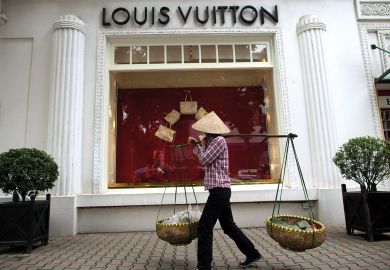Large investment requirements could be a hurdle to foreign universities wishing to open branch campuses in Vietnam under revised rules, according to analysts.
The Vietnamese government has set out changes to existing rules governing the establishment of branch campuses in the country, which come into force this month.
These include a minimum investment of D500 billion (£15.2 million), but the government has now clarified that investment can happen in stages, as opposed to institutions being required to front all the cash at once.
Any foreign university wishing to establish a branch campus must also have been ranked within the top 500 globally in the past three years.
“In recent years, recognising the gaps in high-skilled workforce to respond to the country’s rapid economic development, the government has issued a number of decrees, circulars and solutions to attract more foreign investment,” said Van Anh Hoang, head of education at the British Council Vietnam.
She said these latest regulations were aimed at attracting “prestigious” higher education institutions to “allow local students a chance to study at quality higher education institutions at home”.
There is currently only one international branch campus in Vietnam, Australian-owned RMIT Vietnam. Earlier this year, the university’s Hanoi campus suspended new admissions because it was full and the university is reportedly considering expanding.
Other universities have opened with foreign investment, including the British University Vietnam in 2009 and the Vietnamese German University in 2008.
“This new decree is also a response to an increasing demand for affordable and quality international education from a growing number of middle-class families in Vietnam,” said Ly Tran, a professor in the School of Education at Deakin University.
According to the British Council, Vietnam is the third largest sending country of international students, including those on short-term exchanges, with South Korea and Japan among the most popular destinations.
“The appetite among foreign universities to establish branch campuses in Vietnam is quite high, especially in the current context where major destination countries like Canada, Australia and the UK are facing headwinds due to rising politicalisation of international education and tightening onshore international student recruitment,” Professor Tran said.
However, while there is a growing market for foreign degree programmes, the financial requirements of setting up could prove too high for many institutions.
The minimum investment was already a “major barrier to many high-quality universities interested in establishing foreign campuses in Vietnam”, according to Professor Tran.
Ms Hoang believed some universities might consider partnership models, such as the collaboration between Lancaster University, Deakin University and Navitas in Indonesia.
Additionally, “to avoid risk in large investment capital, some universities are seeking to deliver their programmes under TNE arrangements”, like the five UK universities already offering courses through the British University of Vietnam, she said.
Register to continue
Why register?
- Registration is free and only takes a moment
- Once registered, you can read 3 articles a month
- Sign up for our newsletter
Subscribe
Or subscribe for unlimited access to:
- Unlimited access to news, views, insights & reviews
- Digital editions
- Digital access to THE’s university and college rankings analysis
Already registered or a current subscriber?








